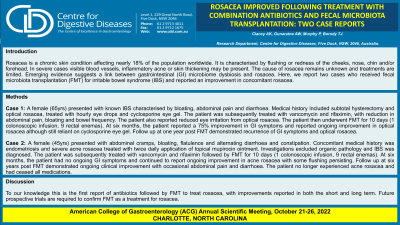Back


Poster Session D - Tuesday Morning
Category: Functional Bowel Disease
D0274 - Rosacea Improved Following Treatment With Combination Antibiotics and Fecal Microbiota Transplantation: Two Case Reports
Tuesday, October 25, 2022
10:00 AM – 12:00 PM ET
Location: Crown Ballroom

Has Audio

Thomas J. Borody, MD, PhD, DSc, FACG
Centre for Digestive Diseases
Five Dock, New South Wales, Australia
Presenting Author(s)
Annabel K. Clancy, BSc, APD, PhD, Anoja W. Gunaratne, BAMS, MSc, PhD, Portia Murphy, BSc, Thomas J. Borody, MD, PhD, DSc, FACG
Centre for Digestive Diseases, Five Dock, New South Wales, Australia
Introduction: Rosacea is a chronic skin condition affecting nearly 18% of the population worldwide. It is characterised by flushing or redness of the cheeks, nose, chin and/or forehead. In severe cases visible blood vessels, inflammatory acne or skin thickening may be present. The cause of rosacea remains unknown and treatments are limited. Emerging evidence suggests a link between gastrointestinal (GI) microbiome dysbiosis and rosacea. Here, we report two cases who received fecal microbiota transplantation (FMT) for irritable bowel syndrome (IBS) and reported an improvement in concomitant rosacea.
Case Description/Methods: Case 1: A female (65yrs) presented with known IBS characterised by bloating, abdominal pain and diarrhoea. Medical history included subtotal hysterectomy and optical rosacea, treated with hourly eye drops and cyclosporine eye gel. The patient was subsequently treated with vancomycin and rifaximin, with reduction in abdominal pain, bloating and bowel frequency. The patient also reported reduced eye irritation from optical rosacea. The patient then underwent FMT for 10 days (1 colonoscopic infusion, 9 rectal enemas). At six months, the patient reported a 75% improvement in GI symptoms and reported ongoing improvement in optical rosacea although still reliant on cyclosporine eye gel. Follow up at one year post FMT demonstrated recurrence of GI symptoms and optical rosacea.
Case 2: A female (45yrs) presented with abdominal cramps, bloating, flatulence and alternating diarrhoea and constipation. Concomitant medical history was endometriosis and severe acne rosacea treated with twice daily application of topical mupirocin ointment. Investigations excluded organic pathology and IBS was diagnosed. The patient was subsequently treated with vancomycin and rifaximin followed by FMT for 10 days (1 colonoscopic infusion, 9 rectal enemas). At six months, the patient had no ongoing GI symptoms and continued to report ongoing improvement in acne rosacea with some flushing persisting. Follow up at six years post FMT demonstrated ongoing clinical improvement with occasional abdominal pain and diarrhoea. The patient no longer experienced acne rosacea and had ceased all medications.
Discussion: To our knowledge this is the first report of antibiotics followed by FMT to treat rosacea, with improvements reported in both the short and long term. Future prospective trials are required to confirm FMT as a treatment for rosacea.
Disclosures:
Annabel K. Clancy, BSc, APD, PhD, Anoja W. Gunaratne, BAMS, MSc, PhD, Portia Murphy, BSc, Thomas J. Borody, MD, PhD, DSc, FACG. D0274 - Rosacea Improved Following Treatment With Combination Antibiotics and Fecal Microbiota Transplantation: Two Case Reports, ACG 2022 Annual Scientific Meeting Abstracts. Charlotte, NC: American College of Gastroenterology.
Centre for Digestive Diseases, Five Dock, New South Wales, Australia
Introduction: Rosacea is a chronic skin condition affecting nearly 18% of the population worldwide. It is characterised by flushing or redness of the cheeks, nose, chin and/or forehead. In severe cases visible blood vessels, inflammatory acne or skin thickening may be present. The cause of rosacea remains unknown and treatments are limited. Emerging evidence suggests a link between gastrointestinal (GI) microbiome dysbiosis and rosacea. Here, we report two cases who received fecal microbiota transplantation (FMT) for irritable bowel syndrome (IBS) and reported an improvement in concomitant rosacea.
Case Description/Methods: Case 1: A female (65yrs) presented with known IBS characterised by bloating, abdominal pain and diarrhoea. Medical history included subtotal hysterectomy and optical rosacea, treated with hourly eye drops and cyclosporine eye gel. The patient was subsequently treated with vancomycin and rifaximin, with reduction in abdominal pain, bloating and bowel frequency. The patient also reported reduced eye irritation from optical rosacea. The patient then underwent FMT for 10 days (1 colonoscopic infusion, 9 rectal enemas). At six months, the patient reported a 75% improvement in GI symptoms and reported ongoing improvement in optical rosacea although still reliant on cyclosporine eye gel. Follow up at one year post FMT demonstrated recurrence of GI symptoms and optical rosacea.
Case 2: A female (45yrs) presented with abdominal cramps, bloating, flatulence and alternating diarrhoea and constipation. Concomitant medical history was endometriosis and severe acne rosacea treated with twice daily application of topical mupirocin ointment. Investigations excluded organic pathology and IBS was diagnosed. The patient was subsequently treated with vancomycin and rifaximin followed by FMT for 10 days (1 colonoscopic infusion, 9 rectal enemas). At six months, the patient had no ongoing GI symptoms and continued to report ongoing improvement in acne rosacea with some flushing persisting. Follow up at six years post FMT demonstrated ongoing clinical improvement with occasional abdominal pain and diarrhoea. The patient no longer experienced acne rosacea and had ceased all medications.
Discussion: To our knowledge this is the first report of antibiotics followed by FMT to treat rosacea, with improvements reported in both the short and long term. Future prospective trials are required to confirm FMT as a treatment for rosacea.
Disclosures:
Annabel Clancy: Centre for Digestive Diseases – Employee.
Anoja Gunaratne: Centre for Digestive Diseases – Employee.
Portia Murphy: Centre for Digestive Diseases – Employee.
Thomas Borody: Axent medical Pty. Ltd – Advisory Committee/Board Member. Centre for Digestive Diseases – Advisory Committee/Board Member, Consultant, Employee, Grant/Research Support, Intellectual Property/Patents, Ownership interest, Owner/Ownership Interest, Stock-privately held company. Finch Therapeutics – Advisory Committee/Board Member, Intellectual Property/Patents, Stock-publicly held company(excluding mutual/index funds). Topelia Therapeutics – Advisor or Review Panel Member, Intellectual Property/Patents.
Annabel K. Clancy, BSc, APD, PhD, Anoja W. Gunaratne, BAMS, MSc, PhD, Portia Murphy, BSc, Thomas J. Borody, MD, PhD, DSc, FACG. D0274 - Rosacea Improved Following Treatment With Combination Antibiotics and Fecal Microbiota Transplantation: Two Case Reports, ACG 2022 Annual Scientific Meeting Abstracts. Charlotte, NC: American College of Gastroenterology.
